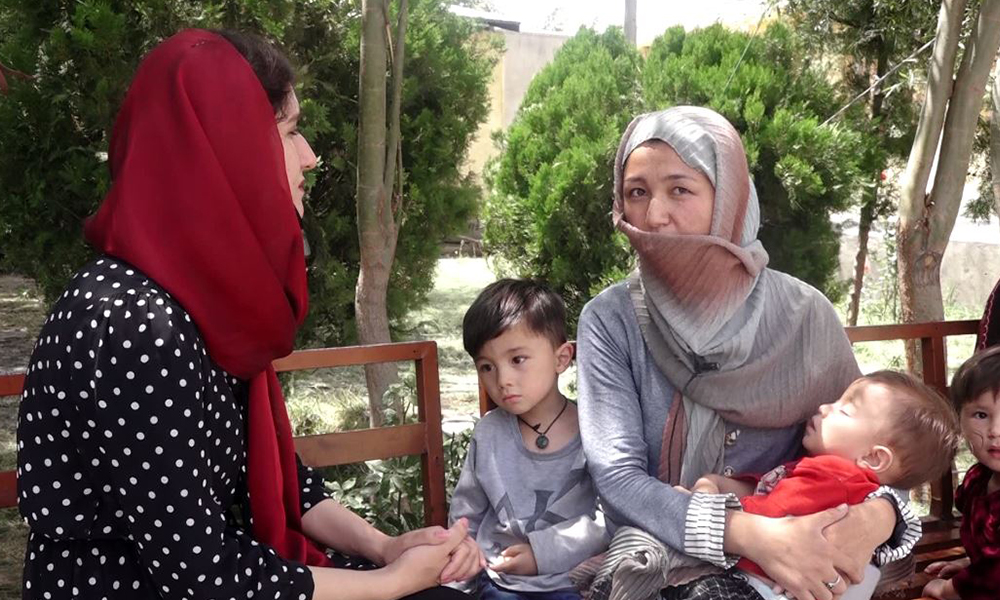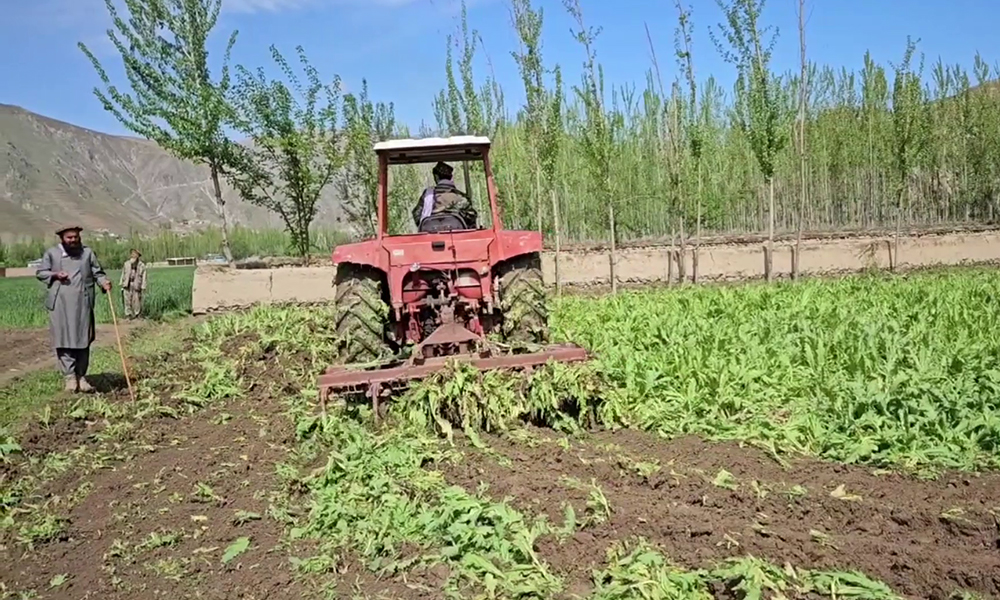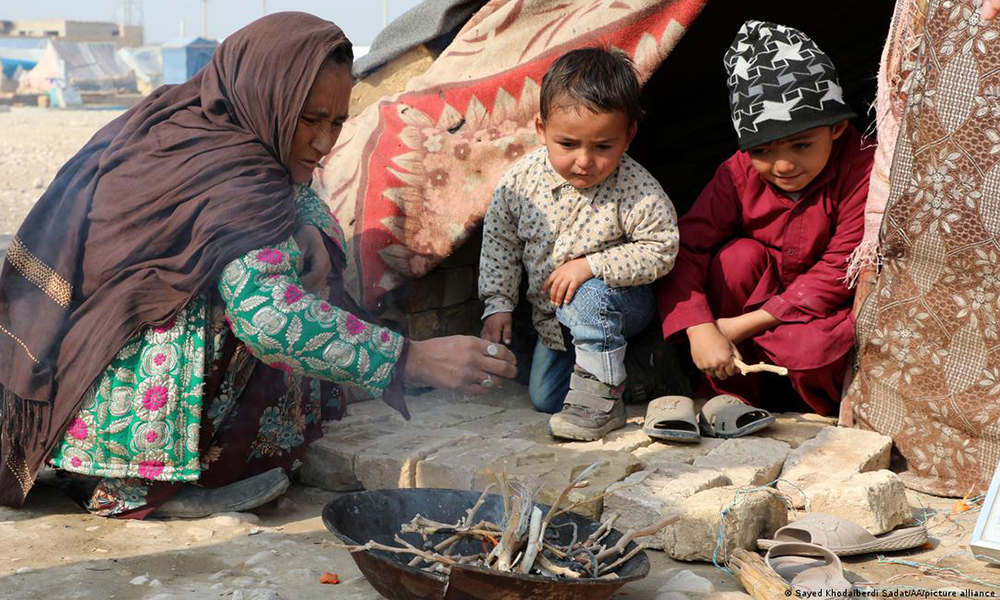Latest News
Rights watchdog calls for truce as IDP numbers skyrocket

The Afghanistan Independent Human Rights Commission has called on the Afghan government, the Taliban and the international community to support and strengthen efforts to bring about peace as the escalating violence has resulted in a spike in Internally Displaced People (IDPs).
In a report issued Wednesday by the AIHRC it said: “We call on the Afghan government, the Taliban, and the international community to work hard to support and strengthen the justice-oriented peace process, establish a ceasefire, and put an end to war and violence, as major causes of internal displacement in the country.”
The organization also urged relevant departments and other stakeholders to take immediate action to provide temporary housing for IDPs and to address their basic needs, particularly access to food, drinking water, and health services.
“We urge national and international organizations working in this field to work on developing programs and establishing or strengthening the structures required for IDPs’ access to housing, education, health, social participation, and psychosocial support,” the organization said.
This comes after the AIHRC conducted a field study in 30 provinces on the plight of IDPs.
According to the State Ministry for Natural Disaster Management statistics, almost five million people have been displaced due to insecurity and violence by anti-government armed groups in the past two years.
The AIHRC meanwhile said recent data indicates 62,480 families have been displaced in the last six months, out of which, 32,284 families from 25 different provinces have been displaced due to escalation of war and violence in just one month – between June 7th – July 8th.
A comparison of 2015 statistics by the Ministry of Refugees and Repatriations (1.2 million) and this year’s statistics by the State Ministry for Natural Disaster Management shows that the number of IDPs has increased by 74.8 percent
AIHRC investigations found that 158,392 families from 26 provinces have been displaced due to war and insecurity in the first three months of this solar year (March 20, 2021 to June 21, 2021).
Nangarhar, with 22,790 displaced families, is at the top of the list, while Samangan, with 100 displaced people, is at the bottom.
The AIHRC reported that out of all 2,903 respondents in its field study, 281 of them (9.7%) stated that they have been displaced for over five years; 118 respondents (4.1%) said they have been displaced for less than five years; 238 respondents (8.2%) less than four years; 353 respondents (12.2%) less than three years; 497 respondents (17.1%) less than two years; 449 respondents (15.5%) less than one year; and, 949 respondents (32.7%) less than six months.
The study also found that 2,475 respondents (85.3 %) said that they had suffered some type of harm to their permanent residence before being displaced.
Among the people who suffered some form of harm prior to being displaced, 543 (21.9%) lost family members; 316 (12.8%) or their family members have been injured; 849 (34.3%) lost their homes; 344 (13.9%) lost their crops; 247 (11.1%) lost their job; 63 (2.5%) or their children have been deprived of education; and, 86 (3.5%) have not responded this question.
Out of all 2,475 people who said that they had been harmed before being displaced, 2,062 of them (83.3%) said that anti-government armed groups harmed them; 233 of them (9.4%) said that pro-government forces had harmed them; and the remaining 180 of them have said that they have been harmed by natural disasters in their permanent residence.
The study also found that access to stable jobs, shelter, health services and education were also a problem for the IDPs.
Latest News
Over 6,000 acres of land cleared of poppies in Badakhshan

Badakhshan Police Command says it has cleared more than 6,000 acres of poppy fields in northern Badakhshan province.
The anti-narcotics department of Badakhshan Police Command says that since the beginning of the campaign to destroy the poppy fields in this province, they have cleared more than 6,000 acres of land.
According to these officials, poppies have however been planted in more than 10 districts this year.
The anti-narcotics department of the Badakhshan Police Command says that the campaign to destroy the poppy plantations started two months ago and continues.
According to the officials, during this period, 6,300 acres of land has been cleared.
Some of the farmers whose fields were destroyed say that poppy is more profitable than other agricultural products, but now that their land has been cleared, they want alternative crops.
According to the officials, Kishim, Argo, Darayimand and Jurm districts are among the districts where poppies are cultivated.
Latest News
MSF ‘deeply concerned’ over new phase of deportations of Afghans from Pakistan

Médecins Sans Frontières (MSF) said Wednesday it was deeply concerned for the rights and welfare of Afghan refugees in Pakistan in the wake of the recent announcement by Islamabad that it plans to start Phase Two of the deportation campaign.
Pakistan is home to an estimated 3.7 million Afghans, and a reported 500,000 have crossed the border so far.
Many Afghans living in Pakistan have been there for decades and have spent more time in the country than their country of origin, without any legal recourse to remain in the only place they can effectively call “home”.
For many Afghans, Islamabad’s “repatriation” campaign means packing up their belongings and carrying them on a horse, cart, car and bus and traveling en masse to a country that is already struggling with widespread poverty, inadequate health services and increased restrictions on women, MSF said in a statement.
The second phase of the deportations leaves an estimated 800,000 Pakistan-issued Afghan Citizen Card (ACC) holders vulnerable to return, while phase three is expected to result in the further deportation of UNHCR-issued Proof of Registration (PoR) card holders, MSF said.
MSF first started working in Pakistan in 1986, and today provides much-needed medical care to people in Balochistan, Khyber Pakhtunkhwa and Sindh provinces.
The Islamic Emirate of Afghanistan (IEA) and UN agencies estimate that more than half a million people have been deported from Pakistan or voluntarily returned to Afghanistan in the past six months.
The United Nations High Commissioner for Refugees said last month that nearly two million Afghan refugees are living in Pakistan and that the agency needs $368 million this year to assist these people.
Latest News
2023 marred by ‘tremendous challenges’ for Afghanistan

Last year, 2023, was a year of “tremendous challenges” for the people of Afghanistan, but it was also a year marked by resilience and determination, the Deputy Special Representative of the Secretary-General, Resident and Humanitarian Coordinator, Indrika Ratwatte, said in the UN’s annual report on Afghanistan that was published this week.
Ratwatte said: “In the face of adversity and multiple concurrent shocks, the people of Afghanistan have demonstrated remarkable courage and strength.”
Afghans now mention access to food as their most pressing need, he said adding that “unable to pay for or produce basic sustenance, millions face hunger and malnutrition.”
In 2024, an estimated 15.8 million people will experience crisis and emergency levels of food insecurity.
The majority of the population is unable to procure basic needs such as healthcare, food, livelihoods, and housing, the report stated.
The UN found that the country also remains vulnerable to climate change.
Following the worst drought in three decades, emerging El Niño conditions now threaten a new cycle of flooding and crop pests. In this context, lifesaving humanitarian aid has been crucial in preventing the collapse of the social fabric. It has also served to underpin the stability of the economy. Despite growing humanitarian needs, relevant funding cuts have forced humanitarian actors to prioritize the most vulnerable further, the report stated.
A Gallup poll found that 95 percent of the population consider themselves to be suffering. In addition to living in poverty, the average life expectancy in Afghanistan has been falling for the past five years.
The Herat earthquakes and unprecedented large-scale returns of refugees from neighbouring countries, including Pakistan and Iran, have shown the disruptive impact of recurrent shocks and underscored the need for sustained international engagement and support, the UN stated.
“As we embark on the next chapter, in 2024, it is imperative that we remain steadfast in our commitment to the principles of human rights, gender equality, and women’s Empowerment,” Ratwatte said.
“We will continue to include women as key partners in our work, to provide assistance ‘by women, for women’, and to tirelessly work for equal access to education in line with the demands we hear from Afghans in all areas of the country,” he said.
However, from an economic point of view, Afghanistan’s economy appears to be stabilizing at a low equilibrium level following a period of significant contraction since 2021.
The UN said in the report that growth barriers include severely restricted operations in the banking sector (including microfinance institutions), trade disruptions, and institutional issues hindering service delivery, including in the private sector.
“The sudden cessation of a significant amount of international aid and grants, which had accounted for 40 percent of the country’s Gross Domestic Product (GDP), along with a freeze on international reserves amounting to about US$9 billion and the imposition of international sanctions, caused a severe balance of payments, banking and payment systems crisis.
“Notably, financial restrictions have removed liquidity from the banking system,” the report stated.
Despite the crisis and a period of devaluation towards the end of the year, the AFN is 20 percent stronger than it was in 2021 due to currency export controls, UN cash shipments of US dollars into Afghanistan, and personalremittances.
Imports continued to surpass exports through 2023 and increased as the economy contracted.
“This appears to be a paradox: the currency appreciated while the trade deficit widened, suggesting that there might be other unidentified sources of financing besides US dollar cash shipments and remittances to support the account deficits,” the report read.
The UN also said that with its partners, it will work to initiate a dialogue with the Islamic Emirate on adjustments to regulatory frameworks and sustained public service delivery with the aim of creating a long-term and sustainable pathway to reduce aid dependency and put Afghanistan back on a path towards development
“In this regard, we reiterate our offer to the DFA for a dialogue and will work jointly with international partners, donors, and Afghans on how such engagement can be structured in a most productive way.”
-

 Sport5 days ago
Sport5 days agoACL draw to be broadcast live on ATN channels
-

 Regional5 days ago
Regional5 days agoIRGC chief warns of harsher response if Israel attacks Iran
-

 Sport4 days ago
Sport4 days agoACL fever grows as fixtures finalized
-

 World4 days ago
World4 days agoUS will not take part in any Israeli retaliatory action against Iran
-

 Latest News4 days ago
Latest News4 days agoOver 50 people dead in traffic accidents over Eid
-

 Latest News4 days ago
Latest News4 days agoUS identifies Kabul airport suicide bomber
-

 Business4 days ago
Business4 days agoAfghanistan-Kazakhstan chamber of commerce opens in Herat
-

 Latest News4 days ago
Latest News4 days agoGood rains enable DABS to increase power production in Kabul
























